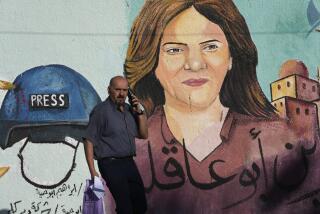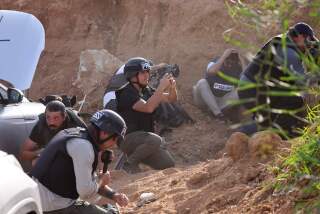REPORTER’S NOTEBOOK : Jordanians See Western Journalists as ‘Sign of Bad Times, Like Vultures’ : Media: The pro-Iraqi nation is showing growing resentment and suspicion of the hordes of reporters who have come to cover the gulf crisis.
- Share via
AQABA, Jordan — The reporters were too busy scribbling in their small note pads to notice that the pilot of the little glass-bottom boat was steering them to an unscheduled stop.
The pair had hired the boat, not to gaze at the elaborate coral formations in the bay, but rather to look at two blockade-busting Iraqi ships at anchor in Aqaba’s port. Their note-taking apparently made the pilot nervous--and he suddenly decided to turn them in as spies to soldiers patrolling a nearby beach.
The incident underlined the growing resentment and suspicion of the hordes of reporters who have landed in Jordan to cover the Middle East crisis from this vantage point next door to Iraq. Most of the reporters are Western, and the Jordanian public has taken a solidly pro-Iraqi stand. As the crisis continues, passions are surfacing more and more frequently.
Rarely on the beaten track of reporters in normal times, Jordan is suddenly a preferred listening post. Refugees from Kuwait and Iraq have been passing through the country by the thousands on their way home. On the way, they have dropped tales of fear and deprivation in Kuwait; an occasional Westerner who escapes finds himself an instant celebrity, so large is the appetite for news of hostages.
Jordan’s position between Iraq and Israel also makes the desert nation an especially sensitive barometer of surrounding tensions. The decision of King Hussein, the country’s leader, to stay on good terms with Iraqi President Saddam Hussein makes the country something of a diplomatic crossroads.
Indeed, just the other day, Iraq’s foreign minister chose Jordan’s capital, Amman, as the place to offer his government’s latest call for talks.
The presence of so many reporters--some estimates put the number at 400--makes Jordanians nervous.
“We see them as a sign of bad times, like vultures,” said Dureid Mahamseh, a local government official in Aqaba.
The sympathies of most Jordanians for Saddam Hussein--who is seen as someone who can stand up to Israel and, with his forcibly augmented oil wealth, as someone who can help Jordan out of its economic problems--has begun to create strains with the journalistic flock.
In Aqaba, the glass-bottom boat’s operator, who had been told by his passengers that they were going to inspect Iraqi ships in the harbor, nonetheless felt that at some point they were doing something sinister.
“Sorry,” he said as he pulled to shore next to the army post. “You are reporters. I am Jordanian.”
On the beach, the reporters introduced themselves to an officer in charge, and the officer, interrupted from his lunch, quickly sent them on their way with only the warning not to approach within 300 yards of the dock. In Arabic, he told the boatman not to bring him any more suspects unless they were taking pictures, an activity always forbidden at the port.
Later, the boatman explained that a colleague of his had been arrested for taking an Italian television crew around the harbor.
In some cases, the pro-Iraqi passions interfere with the normally polite demeanor of Jordanians. In Aqaba recently, a couple of reporters needed to catch a taxi back to Amman, four hours away. The driver they tried to hire, when he found out the reporters were American, launched into a long speech about how the Arabs were victim of Western conspiracies. It was mutually decided that the trip would be too long for both sides to carry on such a conversation and the passengers switched to a less-involved cabbie.
“Tell Bush to stay home,” the driver called out in his send-off. “Death to America.”
These outbursts are the exception, however. During the frequent, well-organized anti-American demonstrations that have taken place in several cities, protesters interrupt their rhythmic chants in order to explain their views quietly and on the side.
Once, when an American flag was being burned at an Amman mosque, a demonstrator sympathetically whispered to a reporter to say that the display was nothing personal--but the reporter explained that the same thing sometimes happens in the United States.
“Oh, you mean you burn foreign flags?” the protester asked.
“No,” the reporter replied, “we more often burn our own flag.”
The demonstrator replied with a confused murmur before returning to his chanting.
More to Read
Sign up for Essential California
The most important California stories and recommendations in your inbox every morning.
You may occasionally receive promotional content from the Los Angeles Times.










